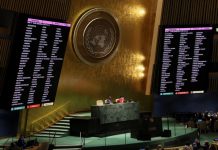Head of Myanmar’s military government, Senior General Min Aung Hlaing, will attend an Association of Southeast Asian Nations (ASEAN) summit in Indonesia next week, Thailand has announced.
It will be General Hlaing’s first known foreign trip since he seized power in a coup on February 1.
On Saturday, Thai foreign ministry spokesman Tanee Sangrat said several leaders of the 10 ASEAN countries, including General Hlaing, had confirmed they would attend the April 24 meeting in Jakarta.
Myanmar has been in upheaval since the military removed an elected government led by Aung San Suu Kyi. Forces have killed at least 728 pro-democracy protesters, according to an activist group, in an attempt to crush nationwide anti-coup protests.
The ASEAN has been trying to encourage talks between the military rulers and the removed government, but the army has shown little willingness to engage.
Meanwhile, forces shot and killed two protesters in the ruby-mining town of Mogok, while several small bombs went off in the largest city of Yangon, wounding several people, media outlets reported.
Earlier, the military government released 23,184 prisoners from jails across the country on Saturday under a New Year amnesty, the Prisons Department said, though few, if any, democracy activists arrested since the coup were thought to be among them.
Saturday is the first day of Myanmar’s New Year and the last day of a five-day holiday that is usually marked with visits to Buddhist temples and raucous water-throwing and partying in the streets.
Suu Kyi is among 3,141 people arrested in connection with the coup, according to a tally by the Assistance Association for Political Prisoners (AAPP). The Nobel laureate faces various charges, including violating an official secrets act, that could see her jailed for 14 years.
Her lawyers reject the charges.
The February 1 coup triggered a massive uprising, bringing hundreds of thousands of protesters to the streets to demand a return to democracy, while civil servants have boycotted work in a bid to shutter the military government’s administration.
The military power grab has also triggered clashes between the army and ethnic minority armed groups in the country’s north and east.
The military has defended its coup by alleging that the result of November’s election was fraudulent, although the election commission dismissed the objections.
The international community has largely condemned the generals for use of force against unarmed civilians – imposing targeted sanctions against top military brass, their families and army-linked businesses.









